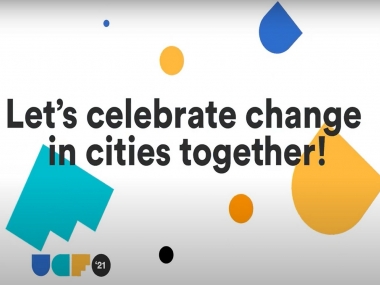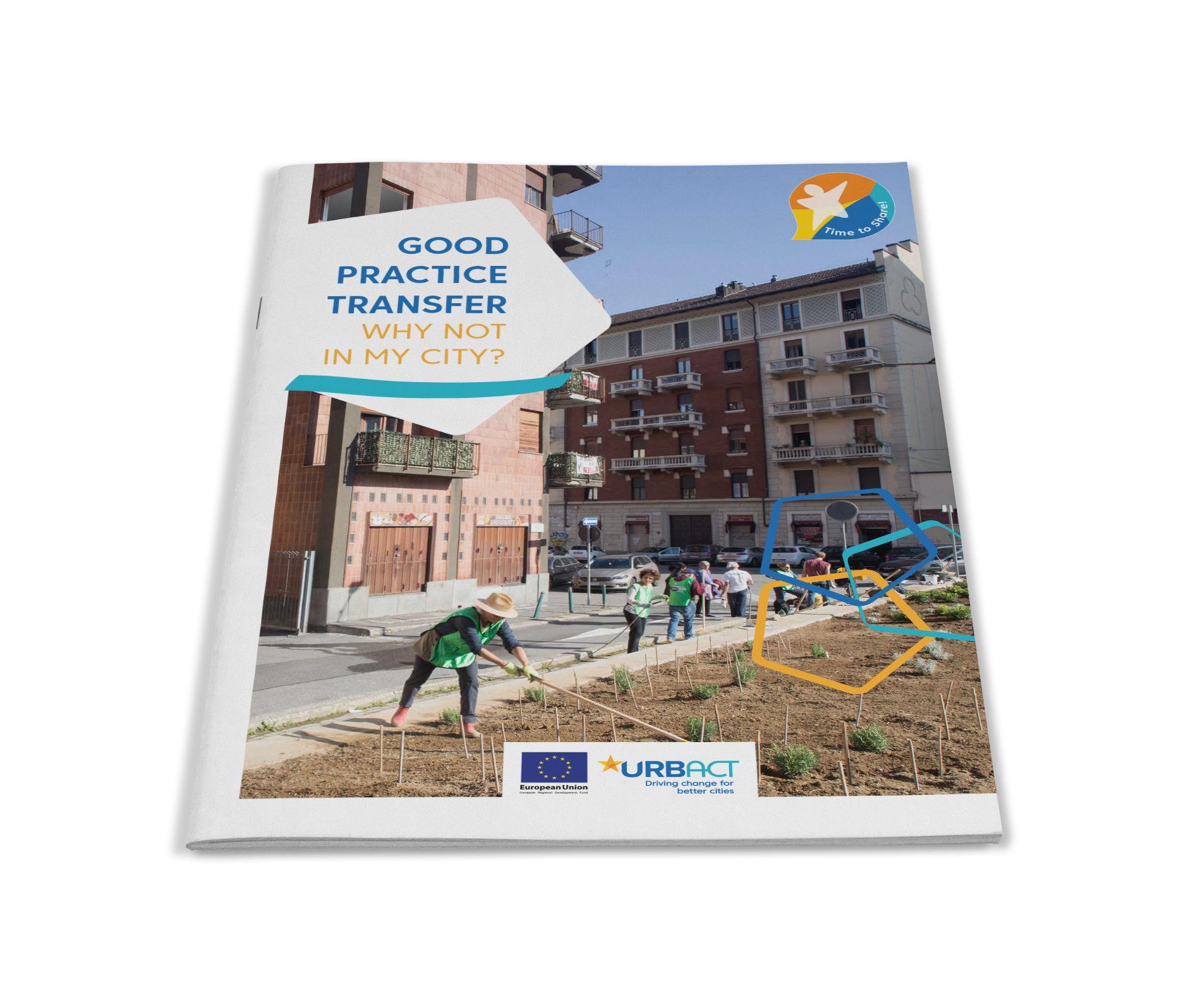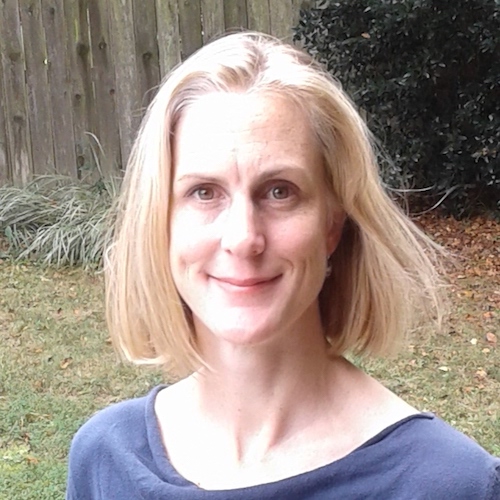Six highlights from this year’s URBACT City Festival
Edited on
22 July 2021Key messages from this year’s URBACT City Festival – a celebration of URBACT’s experiences on the transfer of urban good practice.

The URBACT City Festival this year marked the culmination – and celebration – of 23 URBACT networks of EU cities sharing solutions to urban challenges. See our summary of the event which was held online for the first time, on 15-17 June 2021.
But what were the highlights and main takeaways for the organisers and the more than 860 participants? We spoke to some of them to find out.
1. The 23 URBACT Transfer Networks have been a major success
“There's nothing better than concrete, tangible experiences to illustrate what URBACT is about,” says 2021 URBACT City Festival coordinator, Stefanie Weber. “So, for me the highlight was to listen to stories like how Krakow (PL) turned urban gardens into a local policy, finding out if Cluj-Napoca (RO) was really able to empower city practitioners by stimulating innovative competitions, or how Pamplona (IT) got a step closer to ending the gender gap using public procurement, and understanding how an association in Lisbon (PT) carried out its message on participation and development using a board game and gamification tools. When we look at all these stories together, we grasp the strength of URBACT and get a glimpse of the importance of peer-to-peer exchange.”
For the networks and their partner cities, the event was a valuable opportunity to reflect and share their challenges and successes. BluAct Communication Officers Angelos Ploumis and Avgoustinos Parianos remarked, “the closing of this network that coincided with the URBACT City Festival was the perfect summary of this beautiful journey!”.
During a Mayor’s Question Time session, Tjaša Ficko, Deputy Mayor of Ljubjlana (SI), reflected on her city’s experience as Lead Partner in URBACT BeePathNet,“We grew with the project, we transferred our knowledge to five other cities, but at the same time, we gained their knowledge. When we do things together in a transnational project, when we learn together, we can grow faster, we can see things that if we were alone, we maybe wouldn’t see…”.
 Want to know more about such stories? URBACT’s new publication 'Good Practice Transfer - Why not in my City?' was launched during this year’s Festival. This easy-to-read presentation of the stories from cities in all 23 URBACT Transfer Networks explores the practical solutions they ‘understood, adapted and re-used’, from promoting activities around urban bees to empowering local associations to work together on building their own, job-creating, projects.
Want to know more about such stories? URBACT’s new publication 'Good Practice Transfer - Why not in my City?' was launched during this year’s Festival. This easy-to-read presentation of the stories from cities in all 23 URBACT Transfer Networks explores the practical solutions they ‘understood, adapted and re-used’, from promoting activities around urban bees to empowering local associations to work together on building their own, job-creating, projects.
2. A wealth of urban development knowledge exchanged
The Festival’s mix of 22 plenary sessions and interactive workshops provided inspiration and practical insights for any city looking to become more green, more productive, more just, and more aligned with the needs of citizens.
“Seeing our Festival spread knowledge on integrated and participatory development across the globe was a big achievement for me!” says Stefanie Weber. “With no venue capacity limits, all urban enthusiasts were welcome to celebrate cities with us! People came from all over the world, from Brazil to Japan, keen to find out more about the URBACT Method and the transfer of urban good practices.”
For example, URBACT expert Alisa Vlasic helped run a session on the role of small and medium-sized cities in the tech entrepreneurship ecosystem. “The Festival was really insightful. We had an interesting debate on ‘Who is the main driver of digital economic development?’ – and how [URBACT’s relaunched] TechPlace can facilitate collaboration between the public and private sectors in a digital ecosystem. The speakers were really good!” Want to know more? Check out the session recording on TechPlace Reloaded - join the community!
3. Inspiration for new and continuing URBACT networks
Among the Festival participants were URBACT cities and networks planning future activities – including further transfers of URBACT-accredited Good Practices to yet more EU cities.
“We really appreciated URBACT’s professionalism, the positive energy, valuable insights and this precious ‘lesson’ that will be more than useful for the BluAct 2nd wave that has just started,” highlight Angelos Ploumis and Avgoustinos Parianos.
For Nina Plevnik, co-coordinator of the National URBACT Point in Slovenia, Festival learnings will feed into her country’s recently launched National Practice Transfer Initiative (NPTI) focusing on local NGO support. The network will transfer good practice that Idrija adopted from Altena (DE) to cities new to URBACT. Nina says, “the Festival was a useful reminder of how to make events playful and participative: now it’s up to us to get that same sprit moving for our six new partner cities!”
4. Shining light on the key role of cities – at EU and local levels
In her warm welcome, Elisa Ferreira, European Commissioner for Cohesion and Reforms underlined URBACT cities’ vital role in shaping Europe’s future, saying, “if I can give you one message, it is this: inspire others, spread your ideas, go beyond your usual circle to share knowledge and experience for all Europe’s cities” as Europe gears up for recovery, and a green and digital transition, with ‘once-in-a-generation’ levels of investment. She added, “the projects you develop and the experiences you share must serve as an inspiration to others."
A warm welcome to #URBACTfest from @ElisaFerreiraEC:
— URBACT (@URBACT) June 15, 2021
“Europe needs your ideas, your energy, your inspiration! Because URBACT cities are pioneers of the future. The projects you develop and the experiences you share must serve as an inspiration to others.” https://t.co/CWCTn8jBqo
As for positive impacts at local level, the Festival’s ‘Mayors’ question time’ heard how city decision makers contribute to the success of European Territorial Cooperation programmes like URBACT. Senior political figures from some of the most active and successful URBACT cities shared their enthusiasm: Ricardo Rio, Mayor of Braga (PT); Jordi Mazón (Deputy Mayor for Ecological Transition, Mobility and Waste Collection in Viladecáns (ES), Rebeka Szabó (Deputy Mayor of Zugló, Budapest (HU) and Tjaša Ficko, Deputy Mayor of Ljubjlana (SI).
5. Unexpected lessons from Covid
Covid was a serious hurdle for URBACT transfer activities, in cities already struggling with the effects of the pandemic. But the Festival also highlighted many ways URBACT has helped city resilience during this period. For example, one highpoint for Alisa Vlasic was “hearing how small and medium-sized cities responded to the pandemic, testing out their resilience, learning lessons, and making changes…For example: in Cesena (IT), citizens presented ideas to their local authority on how to use public space. And the public authority accepted. It was a great result! Their URBACT experience helped a lot: they already had the basis for citizen engagement, ready to react when Covid hit.”
6. URBACT’s friendly, interactive vibe lives on…
Secretariat members Adele Bucella and Nuala Morgan guided participants through a diverse, interactive programme covering serious aspects of urban policymaking, but it wasn’t all hard work. There was also speed-networking, a well-being tent, yoga and dancing, as well as cocktail making and an evening concert!
“Of course, we would prefer a face-to-face meeting in a beautiful European city,” say Angelos and Avgoustinos of BluAct, “but what URBACT succeeded to do as an online alternative was the second best thing. A live set of sessions that was never ‘boring’ or ‘usual’, that brought together hundreds of valued participants around Europe. We know how difficult this is from our recent experience organising BluAct’s final hybrid event, online and in seven venues, and creating a documentary for BluAct this May.”
Nina Plevnik adds, “I was super excited to see how an event this big can work online: expectations were definitely high! And it went really great, with a nice relaxed feel, a range of sessions to attend at any point in the day... the URBACT Festival stood out as very memorable compared with the 1001 other online events we’ve had over the past year. Everyone’s welcome, everyone feels like they can say what’s on their mind.”
At the same time, we missed the opportunity to see each other in person, with all the unexpected connections that can arise. With that firmly in mind, we hope to see you all in person at the next URBACT City Festival, already planned for France in 2022!
Explore the full Festival programme, speaker list and exhibition area on the event’s hopin platform
Check out our short Highlights from the #URBACTfest 2021 and more videos on the #URBACTfest YouTube Playlist.
 Submitted by Amy Labarrière on
Submitted by Amy Labarrière on
